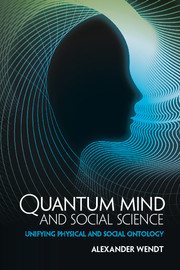Book contents
- Frontmatter
- Dedication
- Epigraph
- Contents
- Acknowledgments
- 1 Preface to a quantum social science
- Part I Quantum theory and its interpretation
- Part II Quantum consciousness and life
- Part III A quantum model of man
- Part IV Language, light, and other minds
- Part V The agent-structure problem redux
- 13 An emergent, holistic but flat ontology
- 14 Towards a quantum vitalist sociology
- Conclusion
- Bibliography
- Index
14 - Towards a quantum vitalist sociology
from Part V - The agent-structure problem redux
Published online by Cambridge University Press: 05 May 2015
- Frontmatter
- Dedication
- Epigraph
- Contents
- Acknowledgments
- 1 Preface to a quantum social science
- Part I Quantum theory and its interpretation
- Part II Quantum consciousness and life
- Part III A quantum model of man
- Part IV Language, light, and other minds
- Part V The agent-structure problem redux
- 13 An emergent, holistic but flat ontology
- 14 Towards a quantum vitalist sociology
- Conclusion
- Bibliography
- Index
Summary
The dominant model of man in naturalistic social science today is materialist, ontologically deterministic, and mechanistic. At least it is no longer behaviorist too; although behavioralism remains strong, almost all social scientists agree that human behavior is affected by unobservable intentional states that must be dealt with as best we can. Yet while it is recognized that people have minds, the fact that our minds are conscious plays little role in mainstream scholarship, where we are modeled as either machines or zombies, and thus, in effect, as dead. If this is true of human beings, in turn, then it must be all the more so of society. And indeed, in contemporary sociology materialism is unquestioned, error terms are chalked up to complexity or poor data rather than free will, and causal mechanisms are the gold standard of explanation. At the end of the day, social systems are just matter in motion – complex, even intelligent matter, but dead just the same.
In this book I have laid the groundwork for a different, albeit still naturalist, sociology. Building on quantum consciousness theory, in Parts II and III I argued that human beings are conscious, free, and purposive in a teleological sense – in short, very much alive. I suggested this amounts to a genuinely vitalist ontology – not the ersatz vitalism of New Materialism, but a phenomenological vitalism in which subjectivity is constituted by a physical but non-material and unobservable life force: quantum coherence. In subsequent chapters I extended this framework to social structures, which by virtue of the quantum character of language entangle individuals with and enable them to act non-locally upon each other. Like the minds of individuals, social structures are in superposition and thus also exhibit quantum coherence. The question that arises, therefore, is whether my phenomenological vitalism extends to social systems, which is to say, is society itself an organism, with subjectivity and consciousness? The logic of my argument I think demands an affirmative answer, though it is such a controversial claim that I hesitate to bring it up – both because it risks undermining all my hard work, and because I cannot give it the theoretical development it deserves here.
- Type
- Chapter
- Information
- Quantum Mind and Social ScienceUnifying Physical and Social Ontology, pp. 267 - 282Publisher: Cambridge University PressPrint publication year: 2015



